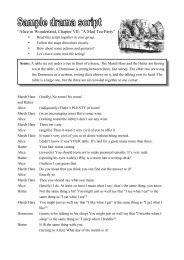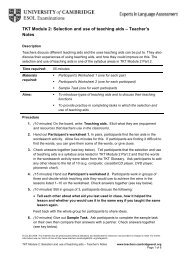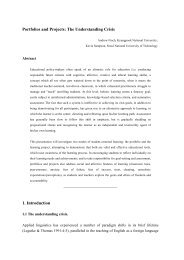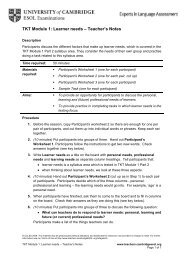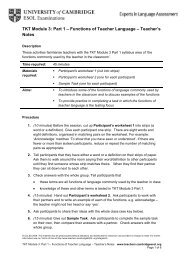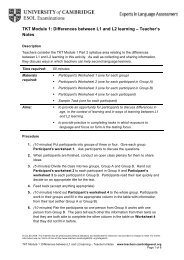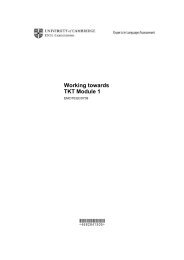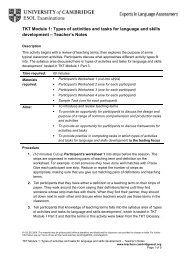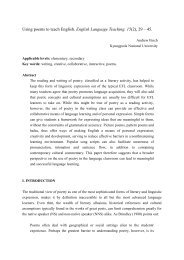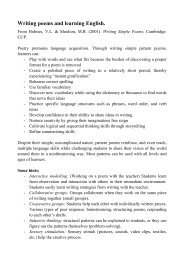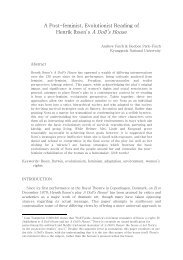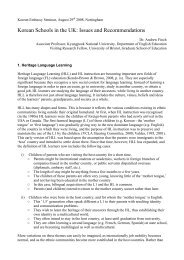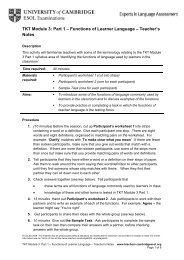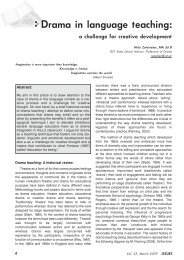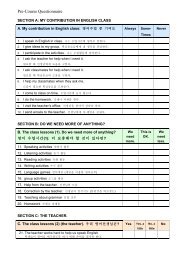Assessment Types and Tasks - Finchpark
Assessment Types and Tasks - Finchpark
Assessment Types and Tasks - Finchpark
Create successful ePaper yourself
Turn your PDF publications into a flip-book with our unique Google optimized e-Paper software.
TKT Module 1: <strong>Assessment</strong> <strong>Types</strong> <strong>and</strong> <strong>Tasks</strong> – Teacher’s Notes<br />
Description<br />
This activity introduces teachers to the TKT Module 1 Part 3 syllabus area relating to<br />
assessment types <strong>and</strong> tasks. Participants discuss some of the purposes <strong>and</strong> methods of<br />
assessment <strong>and</strong> familiarise themselves with different types of assessment.<br />
Time required:<br />
Materials<br />
required:<br />
60 minutes<br />
• Participant’s Worksheet 1 (one for each group of participants)<br />
• Participant’s Worksheet 2 (one copy for each pair of participants, cut<br />
into strips)<br />
• Participant’s Worksheet 3 (one for each participant)<br />
• Participant’s Worksheet 4 (one for each participant)<br />
• Sample Task (one for each participant)<br />
Aims: • To provide an opportunity for participants to discuss the purposes of<br />
assessment <strong>and</strong> methods of assessment.<br />
Procedure<br />
• To look at the design <strong>and</strong> purpose of a range of assessment tasks<br />
<strong>and</strong> activities.<br />
• To provide practice in completing tasks in which assessment types<br />
<strong>and</strong> activities is the testing focus.<br />
1. Before the session, make enough copies of Participant’s Worksheet 2 for every 2<br />
students <strong>and</strong> cut each copy into strips.<br />
2. (10 minutes) Put participants into groups of three. H<strong>and</strong> out Participant’s<br />
Worksheet 1, the list of teachers’ comments about assessment. Participants talk<br />
together about each of the comments <strong>and</strong> say if they agree or disagree, <strong>and</strong> why.<br />
3. Take feedback with the whole group so participants can share opinions.<br />
4. (10 minutes) Each of the comments is about a different type of assessment. H<strong>and</strong><br />
out Participant’s Worksheet 2 (methods of assessment) to each pair of participants<br />
cut into strips. Ask participants to work in pairs <strong>and</strong> to match the method of<br />
assessment with the teachers’ comments. They may need to use more than one<br />
method of assessment for each comment.<br />
5. Check answers together (see key below).<br />
6. (10 minutes) Explain that in TKT Module 1 Part 3, in the syllabus area ‘assessment<br />
types <strong>and</strong> tasks’ the following are tested:<br />
• knowledge of methods of assessment<br />
• purposes for assessment<br />
© UCLES 2009. This material may be photocopied (without alteration) <strong>and</strong> distributed for classroom use provided no charge is made. For further<br />
information see our Terms of Use at http://www.teachers.cambridgeESOL.org/ts/legalinfo<br />
TKT Module 1: <strong>Assessment</strong> <strong>Types</strong> <strong>and</strong> <strong>Tasks</strong> – Teacher’s Notes<br />
www.teachers.cambridgeesol.org<br />
Page 1 of 8
You will now look at purposes for assessment. Put participants into pairs. H<strong>and</strong> out<br />
Participant’s Worksheet 3 <strong>and</strong> ask them to identify the purpose of each of the<br />
different types of assessment by identifying the correct term for each one.<br />
7. Check answers together (see key below).<br />
8. (10 minutes) Put participants into groups of three. Together, they should brainstorm<br />
<strong>and</strong> make a list of the different types of tasks that can be used in assessment. They<br />
should think of exams they have taken themselves to give them ideas.<br />
9. H<strong>and</strong> out Participant’s Worksheet 4. Participants continue working in groups <strong>and</strong><br />
answer Exercise 1 (they name the different types of tasks on the worksheet).<br />
10. Check answers together (see key below).<br />
11. (5 minutes) Introduce the idea of subjective <strong>and</strong> objective assessment <strong>and</strong> marking.<br />
Ask participants:<br />
• What is the difference between subjective <strong>and</strong> objective assessment<br />
(An objective test is marked without using the examiner’s opinion, there is a<br />
clear right answer. A subjective test is marked using the examiner’s opinion<br />
about the quality of the answer. The answer is not simply right or wrong.)<br />
Ask participants to look at Exercise 2 on Worksheet 4 (they say which of the tasks<br />
would be subjective <strong>and</strong> which would be objective).<br />
12. Check answers together (see key below).<br />
13. (10minutes) Give out Sample Task. Ask participants to complete the sample task<br />
on their own then compare their answers with a partner.<br />
14. Check answers together (see key below).<br />
15. (5 minutes) Round up to summarise points covered. Ask participants:<br />
• What is the TKT Module 1 syllabus area for this session (assessment<br />
types <strong>and</strong> tasks)<br />
• What is students’ attitude towards assessment (allow participants to<br />
share experiences)<br />
• How can you prepare for this part of TKT (E.g. review terms in the TKT<br />
glossary under assessment. Try out different assessment task types.)<br />
© UCLES 2009. This material may be photocopied (without alteration) <strong>and</strong> distributed for classroom use provided no charge is made. For further<br />
information see our Terms of Use at http://www.teachers.cambridgeESOL.org/ts/legalinfo<br />
TKT Module 1: <strong>Assessment</strong> <strong>Types</strong> <strong>and</strong> <strong>Tasks</strong> – Teacher’s Notes<br />
www.teachers.cambridgeesol.org<br />
Page 2 of 8
TKT Module 1: <strong>Assessment</strong> <strong>Types</strong> <strong>and</strong> <strong>Tasks</strong> – Answer Keys<br />
Key to Procedure step 5<br />
1. Self assessment<br />
2. Formal assessment; summative assessment<br />
3. Peer assessment.<br />
4. Informal assessment; formative assessment; continuous assessment.<br />
5. Portfolio assessment; informal assessment (could be formal if submitted at the end of<br />
a course for evaluation); continuous assessment.<br />
Key to Participant’s Worksheet 3<br />
1 C 2 E 3 A 4 B 5 D<br />
Key to Participant’s Worksheet 4<br />
1. Cloze test/gap fill (in a cloze test the gaps are regular e.g. every seventh word, a gap<br />
fill is not regular but selected by the teacher or assessor)<br />
2. Comprehension task – open comprehension questions (students answer in their own<br />
words)<br />
3. Matching task<br />
4. Multiple-choice task<br />
5. Sentence completion task<br />
6. Sentence transformation task<br />
7. Sentence ordering task/Jumbled sentence task<br />
8. Odd one out task<br />
9. Essay/letter writing task<br />
10. Speaking task<br />
Key to Participant’s Worksheet 4 Exercise 2<br />
1. Subjective (many possible answers)<br />
2. Subjective<br />
3. Objective<br />
4. Objective<br />
5. Subjective<br />
6. Objective<br />
7. Objective<br />
8. Objective<br />
9. Subjective<br />
10. Subjective<br />
Key to Sample Task<br />
1 B 2 E 3 A 4 F 5 C<br />
© UCLES 2009. This material may be photocopied (without alteration) <strong>and</strong> distributed for classroom use provided no charge is made. For further<br />
information see our Terms of Use at http://www.teachers.cambridgeESOL.org/ts/legalinfo<br />
TKT Module 1: <strong>Assessment</strong> <strong>Types</strong> <strong>and</strong> <strong>Tasks</strong> – Answer Keys<br />
www.teachers.cambridgeesol.org<br />
Page 3 of 8
TKT Module 1: <strong>Assessment</strong> <strong>Types</strong> <strong>and</strong> <strong>Tasks</strong> – Participant’s<br />
Worksheet 1<br />
Discuss the teachers’ comments below on assessment. Do you agree or disagree<br />
Why/ Why not<br />
1. I think it’s important for students to assess themselves, so sometimes I record them<br />
when they are doing a speaking activity <strong>and</strong> then get them to listen to themselves.<br />
2. I don’t like giving my students tests <strong>and</strong> exams. I think they are demotivating,<br />
especially for young learners.<br />
3. I get students to mark each others’ written work <strong>and</strong> I tell them to just look at it <strong>and</strong><br />
say what’s wrong. I don’t ask them to check it against any criteria. I don’t think they<br />
can look for particular mistakes like spelling mistakes or grammar mistakes.<br />
4. When students are doing a speaking activity, I observe them, but I don’t make any<br />
notes <strong>and</strong> I don’t give marks. Sometimes I talk to students about their strengths <strong>and</strong><br />
weaknesses in tutorials though.<br />
5. My students choose pieces of their best work during the course <strong>and</strong> keep them in a<br />
file, which can be looked at during the course. I know some teachers use this as the<br />
way they assess students at the end of the course, but I’m not sure how that works.<br />
© UCLES 2009. This material may be photocopied (without alteration) <strong>and</strong> distributed for classroom use provided no charge is made. For further<br />
information see our Terms of Use at http://www.teachers.cambridgeESOL.org/ts/legalinfo<br />
TKT Module 1: <strong>Assessment</strong> <strong>Types</strong> <strong>and</strong> <strong>Tasks</strong> – Participant’s Worksheet 1<br />
www.teachers.cambridgeesol.org<br />
Page 4 of 8
TKT Module 1: <strong>Assessment</strong> <strong>Types</strong> <strong>and</strong> <strong>Tasks</strong> – Participant’s<br />
Worksheet 2<br />
Formal assessment – When a students’ work is judged through a test <strong>and</strong> the student is<br />
given a report or a grade to say how successful or unsuccessful they have been.<br />
Summative assessment – when a test is used at the end of a course. A mark or grade is<br />
given, but no other feedback.<br />
Informal assessment – When a teacher decides whether a student is doing well or not but<br />
does not necessarily set a test or write an official report or give a grade.<br />
Formative assessment – When a teacher gives students feedback on their progress during<br />
a course, rather than at the end of it, so that they can learn from the feedback.<br />
Portfolio assessment – A collection of work that a student uses to show what he/she has<br />
done during a particular course. A purposeful document, regularly added to that may be part<br />
of assessment.<br />
Continuous assessment – A type of testing which is different from a final examination.<br />
Some or all of the work that students do during a course is considered by the teacher on a<br />
regular basis <strong>and</strong> contributes to the final grade given to students. It may also include<br />
monitoring of classroom performance <strong>and</strong> contribution.<br />
Peer assessment – When students give feedback on each others’ language, work, learning<br />
strategies, performance.<br />
Self assessment – When students decide for themselves if they think their progress or<br />
language use is good or not.<br />
© UCLES 2009. This material may be photocopied (without alteration) <strong>and</strong> distributed for classroom use provided no charge is made. For further<br />
information see our Terms of Use at http://www.teachers.cambridgeESOL.org/ts/legalinfo<br />
TKT Module 1: <strong>Assessment</strong> <strong>Types</strong> <strong>and</strong> <strong>Tasks</strong> – Participant’s Worksheet 2<br />
www.teachers.cambridgeesol.org<br />
Page 5 of 8
TKT Module 1: <strong>Assessment</strong> <strong>Types</strong> <strong>and</strong> <strong>Tasks</strong> – Participant’s<br />
Worksheet 3<br />
Choose the correct term from the box below for the types of test described.<br />
A. Placement test B. Diagnostic test<br />
C. Progress test D. Proficiency test E. Achievement test<br />
1. This type of test is used during a course in order to assess the learning up to a<br />
particular point in the course.<br />
2. This type of test is used to see how well students have learned the language<br />
<strong>and</strong> skills taught in class. These tests are often at the end of term or end of the<br />
year <strong>and</strong> test the main points of what has been taught in that time.<br />
3. This type of test is often used at the beginning of a course in a language school<br />
in order to identify a student’s level of language <strong>and</strong> find the best class for them.<br />
4. This type of test is used to identify problems that students have with language or<br />
skills. The teacher tries to find out what language problems students have. It<br />
helps the teacher to plan what to teach in future.<br />
5. This type of test is used to see how good students are at using the language.<br />
The contents of this type of test are not chosen according to what has been<br />
taught, but according to what is needed for a particular purpose.<br />
© UCLES 2009. This material may be photocopied (without alteration) <strong>and</strong> distributed for classroom use provided no charge is made. For further<br />
information see our Terms of Use at http://www.teachers.cambridgeESOL.org/ts/legalinfo<br />
TKT Module 1: <strong>Assessment</strong> <strong>Types</strong> <strong>and</strong> <strong>Tasks</strong> – Participant’s Worksheet 3<br />
www.teachers.cambridgeesol.org<br />
Page 6 of 8
TKT Module 1: <strong>Assessment</strong> <strong>Types</strong> <strong>and</strong> <strong>Tasks</strong> – Participant’s<br />
Worksheet 4<br />
Exercise 1: What are these assessment task <strong>and</strong> activities called<br />
1 Complete the sentences.<br />
2<br />
In Paris the people were much ______ <strong>and</strong><br />
more polite than I had _____. The food<br />
though was not as _______.<br />
Read the text <strong>and</strong> answer the<br />
following questions.<br />
Why did John go to the party<br />
What happened when he got<br />
there<br />
3 Which word belongs to each group 4<br />
apple<br />
vegetable<br />
juice<br />
meat<br />
potato<br />
fruit<br />
beef<br />
drink<br />
Choose the correct answer.<br />
1. The car he drove was<br />
a) Ford b) Peugeot c) BMW<br />
2. It was<br />
a) red b) white c) black<br />
5 Finish the sentence with an answer from the 6<br />
text.<br />
It was sunny so she _____<br />
___ ____.<br />
Complete sentence B so that it<br />
means the same as sentence A<br />
A. Jack doesn’t have to do the test.<br />
B. It’s ________ Jack to do the<br />
test.<br />
7 Rearrange the words in the sentences. 8<br />
1. month/travelled/France/we/last/to<br />
2. Japan/Tom/a/ago/week/went/to<br />
Which word does not fit the group<br />
cup, plate, knife, bowl<br />
banana, apple, onion, pear<br />
9 Write a letter to a friend inviting him/her to a 10<br />
party at your house next Saturday.<br />
Look at the picture. Talk about the<br />
people, what they are doing <strong>and</strong><br />
what they are wearing. Where do<br />
you think they are going<br />
Exercise 2: Which of the activities <strong>and</strong> tasks are subjective tests <strong>and</strong> which are objective<br />
tests<br />
© UCLES 2009. This material may be photocopied (without alteration) <strong>and</strong> distributed for classroom use provided no charge is made. For further<br />
information see our Terms of Use at http://www.teachers.cambridgeESOL.org/ts/legalinfo<br />
TKT Module 1: <strong>Assessment</strong> <strong>Types</strong> <strong>and</strong> <strong>Tasks</strong> – Participant’s Worksheet 4<br />
www.teachers.cambridgeesol.org<br />
Page 7 of 8
TKT Module 1: <strong>Assessment</strong> <strong>Types</strong> <strong>and</strong> <strong>Tasks</strong> - Sample Task<br />
Exercise 4<br />
For Questions 1–5, match the descriptions of different tests with the types of test listed A–F.<br />
Mark the correct letter (A–F) on your answer sheet.<br />
You need to use some options more than once<br />
<strong>Types</strong> of test<br />
A<br />
B<br />
C<br />
D<br />
E<br />
F<br />
progress<br />
achievement<br />
subjective<br />
proficiency<br />
diagnostic<br />
placement<br />
Descriptions<br />
1 These tests are designed to test language taught on the whole course.<br />
2 These tests are designed to help teachers to plan course content.<br />
3 The purpose of these tests is to test language taught on part of the course.<br />
4 These tests help teachers to put students in classes at the appropriate level.<br />
5 The marking of these tests depends on decisions made by individual examiners.<br />
© UCLES 2009. This material may be photocopied (without alteration) <strong>and</strong> distributed for classroom use provided no charge is made. For further<br />
information see our Terms of Use at http://www.teachers.cambridgeESOL.org/ts/legalinfo<br />
TKT Module 1: <strong>Assessment</strong> <strong>Types</strong> <strong>and</strong> <strong>Tasks</strong> - Sample Task<br />
www.teachers.cambridgeesol.org<br />
Page 8 of 8



